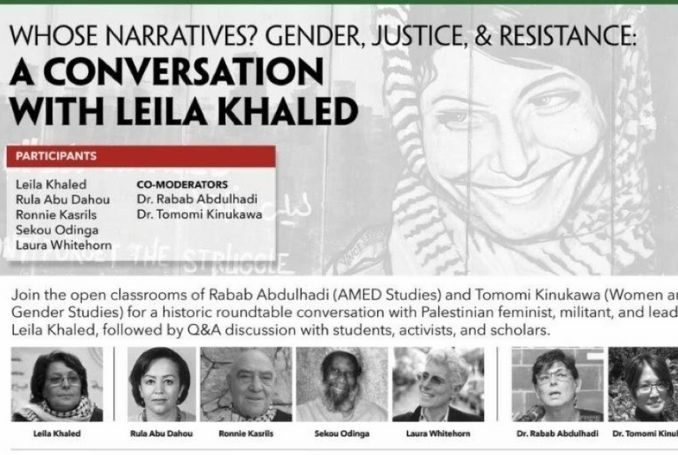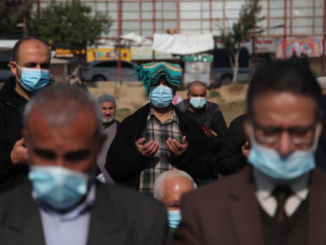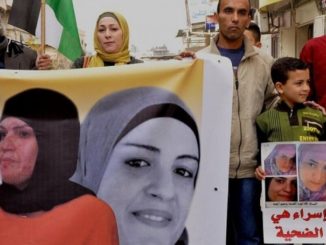
By Benay Blend
“If you have any doubt that the panic over “cancel Culture,” writes Steven Salaita, “as presented by the corporate media, is in aggregate a reactionary phenomenon (with a distinctly Zionist subtext),” then consider that for many decades, he continues, academics who “affirm Palestinian life have been harassed, maligned, fired, and imprisoned” without a word of protest from the “mainstream pundit class.”
Having been unhired by the University of Illinois-Urbana-Champaign for a series of tweets critical of Israel and Zionism, Salaita has the first-hand experience in these matters, as does Prof. Rabab Ibrahim Abdulhadi, Director and Senior Scholar in the Arab and Muslim Ethnicities and Diasporas and Associate Professor of Ethnic Studies at the College of Ethnic Studies-San Francisco State University (SFSU).
Subjected to a bullying campaign launched by an Israel network that seeks to intimidate her and shut down her department, Prof. Abdulhadi’s latest round came with Zoom’s last-minute censoring of an open classroom she had co-organized through the university with her colleague Dr. Tomomi Kinukawa, a lecturer in the Women’s and Gender Studies Department. Titled “Whose Narratives? Gender, Justice, and Resistance: A Conversation with Leila Khaled,” the open classroom drew immediate ire from the same right-wing organizations that have sought to smear her in the past.
In its statement of support, the US Campaign for the Academic and Cultural Boycott of Israel (USACBI) draws several parallels with previous campaigns to smear Prof. Abdulhadi. All are part of a larger effort to silence individuals and organizations who advocate for Palestinian freedom by painting them as anti-Semitic and “terrorist,” charges that USACBI claim are not only “libelous,” but also “poisonous and destructive.”
In an email to San Francisco State Provost Jennifer Summit on hers and Professor Tomomi Kinukawa’s behalf, Prof. Abdulhadi outlines the broader implications of Zoom’s censorship that “violates our freedom of speech and academic freedom as faculty to teach, deprives our students from the right to learn, and denies the general public the right to hear from speakers who are not readily available on mainstream media.”
As Prof. Kinukawa said in a personal email, the actions of a private corporation deprived her students of an educational opportunity at a public university:
“Students in my Women and Gender Studies classes at SFSU, who in preparation for the open classroom read Dr. Abdulhadi’s articles (“Framing Resistance Call and Response: Reading Assata Shakur’s Black Revolutionary Radicalism in Palestine.” and “Gender, Resistance and Liberation in 1960s Palestine Living Under Occupation.” ), were making deep connections between Leila Khaled and other revolutionaries, including Harriet Tubman and Sojourner Truth, as well as drawing inspiration from Leila Khaled’s life for their own struggles in the ongoing racial uprising. SFSU failed to protect the most amazing (I’d say once-in-life) educational opportunity for those students to learn the notion and practice of indivisibility of justice directly from those eminent revolutionaries. What a loss that is. I just feel deeply troubled by the ways in which the neoliberal/racial capitalist framing of “academic freedom” by the University administrators that completely erases those students and their chance to expand their knowledge for resistance and justice. I’m also angry that they had no will to acknowledge our intellectual labor for planning for the open classroom over months. They also completely fail to show any sense of respect to Leila Khaled and other panelists. Do they understand who those people really are , what their work means to people and communities all over the world, and how Dr. Abdulhadi made the historic webinar possible? I, as instructor at SFSU, feel deeply ashamed and embarrassed by what the university did to them and us.”
Professor Abdulhadi told Middle East Eye that neither she nor Professor Kinukawa heard back from the Provost. The Provost also ignored their request for the list of over 1400 webinar registrants that was deleted by Zoom along with the censorship. As a result, neither Professor Abdulhadi nor Kinukawa were able to alert their students, colleagues and other registrants of the webinar of alternative options. As a result, students, faculty on other campuses who were planning to bring their students, and the general public did not know what was going on, leaving the two professors having to clean up their university’s refusal to stand up to Zionist coercion and Zoom’s control of classroom content.
This incident is also part of a much larger issue of increasing suppression of free speech in the US as it relates to the liberation of all oppressed groups, including Palestinian, or what Rabab Abdulhadi refers to as the indivisibility of justice. At the university level, it illustrates the breakdown between public/private spheres that has been going on for years. In Standing Up to the Madness: Ordinary Heroes in Extraordinary Times (2008), Amy Goodman documents that in the early 2000s oil companies began investing in research programs at major universities, so that in return corporations received an extraordinary ability to “set the agenda” (p. 206) at once public institutions.
In this case, the university’s caving in to pressure left the window open for Zoom, a private corporation, to censor speech that should be protected by academic freedom. In her email to Provost Summit, Prof. Abdulhadi expresses this concern, as she asks “the university to seriously and publicly challenge Zoom’s attempt to control higher education and the content of our curriculum and classrooms. The privatization of our education is a serious development. As a public institution, SFSU must refuse and resist.”
Writing for Academe, the blog of the American Association of University Professors, John Wilson reiterated that the attack is “an example of the growing power of conservative cancel culture, and this censorship reveals the threat to academic freedom posed by tech companies who are under intense pressure from the right to ban controversial ideas.”
In a statement on behalf of Palestine Legal, Dima Khalidi makes clear the broader implications to higher ed: “The threat to democracy is elevated by the fact that Zoom’s decision to stamp out discussion of Palestinian freedom comes in response to a systematic repression campaign driven by the Israeli government and its allies.”
Apparently, Zoom had been under pressure from various Israel lobby groups to cancel Profs. Abdulhadi and Kinukawa’s open classroom with SFSU going along with that decision. As Professor Abdulhadi said, “while mildly protesting, both SFSU President and Provost, along with CSU leadership, claimed that they support academic freedom and freedom of speech but did not lift a finger to demand that Zoom honor its contract or provide an alternative platform for the professors to hold their open classroom.”
On Sept. 22, on the pretext of “fighting anti-Semitism,” Zionists held a protest at Zoom headquarters in San Jose, California. SFSU also hosted a rally organized by Zionist groups against the webinar that was co-sponsored by SFSU and attended by SFSU President, Lyn Mahoney. Under the umbrella of various right-wing groups, organizers sited a Sept. 15th letter sent by the Lawfare Project to the Department of Justice’s National Security Division, arguing that SFSU’s hosting of Khaled might violate a specific U.S. statute that prohibits Americans from providing “material support or resources” that furthers terrorism.
Legal counsel to Professors Abdulhadi and Kinukawa, including prominent Jewish lawyers, Michael Deutsch and Dan Siegel, affirmed to the two professors that this a bogus charge that does not stand up to scrutiny. “This is a scare tactic that Zionist groups and their allies are using once again to undermine our academic objectives,” Abdulhadi said. “Unfortunately, SFSU leadership has decided to side with Islamophobic, Orientalist and Zionist narratives and to oppose the legitimization of Palestinian narratives.”
In a 2006 speech given in Madison, Wisconsin, the late historian Howard Zinn spoke about the importance of learning from history, explaining that the government tried very hard to persuade us that the “national interest” is in the common interest. However, the notion of national security is really a pretext to “encircle us all into a nice big bond,” continues Zinn, so that the elite maintain their interests at the expense of the people’s interest with no overlapping between the two.
Zinn’s warning is as relevant today as it was in 2006, as right-wing Zionist groups like Lawfare attempt to create a bond among all Jewish people based on their wrongfully equating Palestinian resistance with terrorism and anti-Zionism.
On the history of how “terrorism” came into widespread use, while not connecting it to Islamophobia, Zinn explains that it replaced Communism as another way to bring people together in their fear of a common “enemy.” So when Lawfare throws around that word, it once again is depending on the same reaction, its audience not looking back at history which shows that, as Zinn explains, “governments are terrorists on an enormously large scale” in their wars against other countries, or, in the case of Israel, in its relentless harm done to the Palestinian people.
In his autobiography, escaped slave Frederick Douglass explains that by telling his own story no one else could distort his history. He owned it, and that, he believed, was a form of power. Accordingly, in their statement of support, USACBI vows to stand with “Prof. Abdulhadi, Leila Khaled, and Palestinians everywhere in their sumud (steadfastness) and determination not simply to remain, but also to resist their own erasure and annihilation.”
Like Douglass, “Whose Narratives?” participants were speaking their truth in defiance of Israel’s wish to have them gone. In response to Prof. Abdulhadi’s question: “Why are Palestinian narratives exceptionalized and why [is] SFSU president siding with Zionist defamation, silencing, and bullying?” there are the obvious reasons: the power of Zionist pressure groups to influence donors; Lawfare’s focus only on Khaled’s image defined by two hijackings in the 1970s, a view that does not include her more recent move from armed resistance to politics; and finally various behind the scenes machinations that most likely will not become public information. Abdulhadi adds another reason, “the low bar with which Islamophobia, anti-Arab racism and hostility to Palestine are part of the status quo at SFSU.”
Less apparent, however, were efforts to “deflect the discussion,” Abdulhadi said, on the part of Israel lobby groups who “are bothered by the ways in which we are focusing on questions of Black liberation, Palestinian liberation and prison abolition, and the connections between these movements.” This was part of a larger drive, perhaps, to destroy that coalition of groups who, like Palestinians, are defining their own paths to liberation. Reflecting these intersectional connections, participants included Sekou Odinga, a former member of the Black Liberation Army and political prisoner for 33 years; Ronnie Kasrils, a Jewish anti-Zionist activist and former member of the armed wing of the African National Congress; and Laura Whitehorn, a political prisoner for 14 years, co-founder of Releasing Aging People in Prison (RAPP), and current member of Jewish Voice for Peace.
Moreover, speaking on the National Mall not far removed from where Black slaves were bought and sold, Trump delivered a Constitution Day address in which he announced an impending executive order “establishing a national commission to promote patriotic education” by “encourage[ing] our educators to teach our children about the miracle of American history.” In particular, he took aim at the late historian Howard Zinn, who he charged taught “propaganda” aimed at “mak[ing] students ashamed of their own history.”
As Peter Drier noted, Trump had probably never heard of Howard Zinn (or read any of his work) until his name appeared on the teleprompter, but that doesn’t make his intention any less insidious. Conservatives, explained Drier, have long worried that Zinn’s writing stirred up dissent, as perhaps they should since that was Zinn’s objective. But now that it has come to Trump’s attention, in the midst of increased protest in the streets, there could be a federal mandate to censor all dissenting voices by replacing them with an unequivocally fascist brand of patriotism.
“Right-wing Israel proxy groups, the Trump administration, and Big Tech private firms are conspiring to censor any and all discussions, scholarship, teaching about or advocacy for Palestinian freedom at a time when Trump’s foreign policy seeks to liquidate the Palestinian issue,” explained Dima Khalidi. “They will not succeed, because people who believe in democracy, dissent, and freedom for all will not be silenced.”
Failed hijackings, canceled classrooms, botched rallies are not really failures if they motivate others to fight back. “The hijacking was 50 years ago this month, and I remember it well, it greatly inspired a little Black girl from a very small, racist town in Oklahoma . . .” recalled Mawusi Ture, who has gone on to a lifetime of committed activism.
Like faculty have always done at public universities threatened by corporate control, Prof. Abdulhadi, and others like her, can be expected to resist. She assured Middle East Eye readers that, “we’re resolute. We are not going to give up. We intend to reschedule the webinar and live stream it. It’s our responsibility as educators at a public university to produce knowledge for social justice and make that knowledge accessible to our students. Black, Brown, Indigenous and Third Would students deserve no less from us than do rich students at private institutions. It’s the indivisibility of justice that motivates us to teach Palestine and support freedom for all.”
– Benay Blend earned her doctorate in American Studies from the University of New Mexico. Her scholarly works include Douglas Vakoch and Sam Mickey, Eds. (2017), “’Neither Homeland Nor Exile are Words’: ‘Situated Knowledge’ in the Works of Palestinian and Native American Writers”. She contributed this article to The Palestine Chronicle.

– Benay Blend earned her doctorate in American Studies from the University of New Mexico. Her scholarly works include Douglas Vakoch and Sam Mickey, Eds. (2017), “’Neither Homeland Nor Exile are Words’: ‘Situated Knowledge’ in the Works of Palestinian and Native American Writers”. She contributed this article to The Palestine Chronicle.







